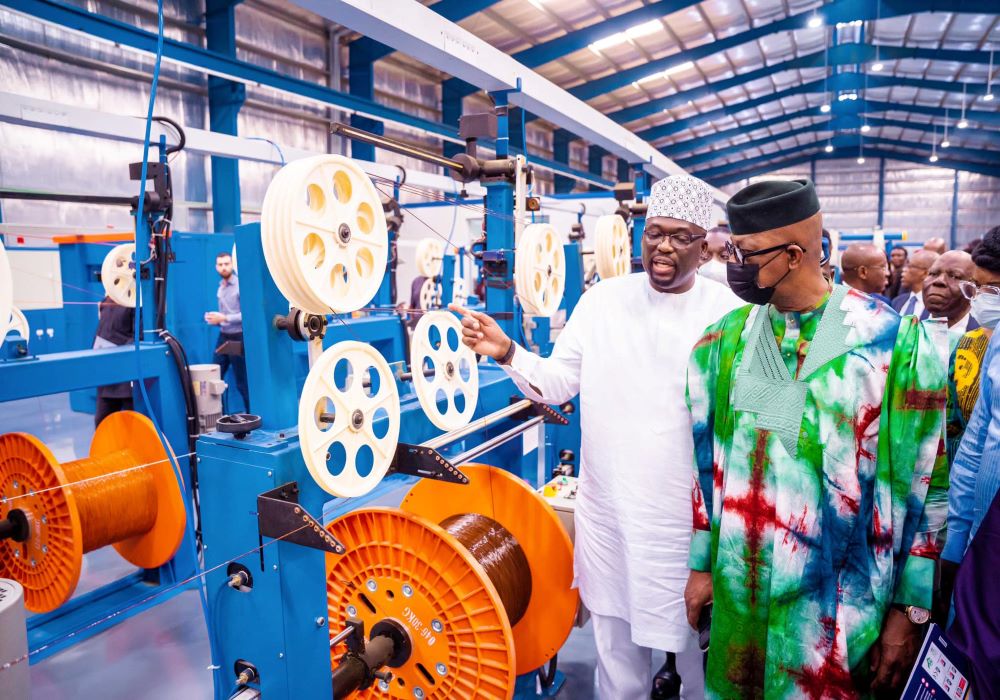Energy
Wabote, Dapo Abiodun Commission Multi-Billion Dollars Fibre Optic Cable Factory

By John Mommoh
An oil and gas service company, Coleman Technical Industries Limited (CTIL) on Friday opened its multi-billion-dollar fibre optic cable manufacturing factory, hoping to take advantage of the African Continental Free Trade Area (AfCFTA) to play big in the African market.
The company is renowned for manufacturing different specifications of high voltage and low voltage cables for the oil and gas industry and construction sector
The Executive Secretary, Nigerian Content Development and Monitoring Board (NCDMB), Engr Simbi Kesiye Wabote in company with the Executive Governor of Ogun State, Prince Dapo Abiodun on Friday commissioned the factory located at Arepo, Ogun State.
The world-class facility is the first of its kind in the West Africa region and 5th in Africa and is expected to help develop the digital economy of the country and the West African region.
Congratulating the company for the feat it achieved, the Executive Secretary remarked that the company has successfully leveraged on the Nigerian Oil & Gas Industry Content Development (NOGICD) Act to invest in difficult terrains that were not possible prior to the enactment of the Act.
He said, “It gladdens my heart to say that Coleman has never looked back and it continues to expand its footprint in the industrialization roadmap of Nigeria. Today is a testament to such expansion efforts.”
Read Also >> NCDMB Partnering Shell, Exxon, NAOC In Oil & Gas Parks – Wabote
Represented at the event by the General Manager, Project Certification and Authorization Division, Engr. Paul Zuhumben, the NCDMB boss hinted that the fibre optic cable factory will further support the employment creation drive of the
The federal government as the facility will employ about 500 persons.
Zuhumben noted that Coleman will benefit from the African Continental Free Trade Area (AfCFTA) which seeks to enable unhindered movement of business, goods and services across the African continent because some of its facilities do not exist in most parts of the continent.
He encouraged Nigerian businesses to emulate Coleman by positioning themselves to take advantage of the provisions of AfCFTA.
He pledged that the Board would continue to support the investment and ensure that project promoter and stakeholders of the Oil and Gas sector buy their fibre optic cables in-country in order to sustain the operations of the facility.
In his remarks, the Executive Governor of Ogun State, Prince Dapo Abiodun hinted that the factory would boost the development of digital economy infrastructure and advance teaching and learning processes in academic institutions across the state and the country.
Abiodun noted that the facility would conserve foreign exchange, promote technology transfer as well as generate employment and alleviate poverty in the state.
In his words, “the manufacture of fibre optic cables locally will aid the deployment of Information Communication Technology (ICT) in the different sectors of the economy.
It will boost tech innovation, advancement in teaching and learning processes in our academic institutions, improve medical care, improve ease and access to data information and enhance internet connection.”
In his welcome address, the Managing Director of Coleman Technical Industries Limited (CTIL), Mr George Onafowokan disclosed that the company had a firm belief in local content and building capacity locally to generate wealth and create jobs.
Onafowokan mentioned that the facility will create about 800 direct jobs and over 2000 indirect jobs. He mentioned that the company is set to commence work on the second phase of the factory in order to meet the market demand for fibre optic cables.
Energy
NLNG Improves Nigeria’s Domestic LPG Supply Efficiency

In line with its continuous improvement culture, the Nigeria LNG Limited (NLNG) will be working closely with its stakeholders to improve operational efficiency in its domestic Liquefied Petroleum Gas (DLPG) supply in Nigeria.
According to a statement from its General Manager, External Relations and Sustainable Development, Sophia Horsfall, this was highlighted at an engagement session with stakeholders in Lagos.
It was gathered that the NLNG plans to enhance engagement and improve operational efficiency of its LPG supply through digitalisation of some of its processes which include a new platform designed to streamline regulatory processes, optimise risk management, and enhance the buyer experience. The platform will feature IT-supported relationship management, automated issue resolution, centralised real-time payments, and improved case management systems, ensuring a seamless supply process despite market shifts and external pressures.
ALSO READ: Ifon-Ilobu Crisis: Adeleke Assures Of Quick Restoration Of Peace
Manager, Commercial Contract Management, NLNG, Tolulope Longe, reiterated that the planned improvements will enable and consolidate NLNG’s resolve to delivering 100% of its LPG supply to the Nigerian market.
She said a strategic roadmap was in play to ensure the achievement of NLNG’s longstanding goals of LPG being accessible and available in the country, aligning with its vision of being a globally competitive energy company, improving lives sustainably. She also harped on the significance of these improvement initiatives and the Company’s push for LPG utilisation as a clean energy source alternative to kerosene and other fossil fuels
Longe noted that the Company remained focused on growth and sustainability of the LPG market by continuously enhancing its supply processes in collaboration with offtakers. She stressed NLNG’s commitment to collaborating with stakeholders to maintain pricing stability and long-term market viability. While acknowledging industry concerns, she noted the importance of operational efficiency in meeting market demands.
NLNG aims to strengthen stakeholder engagement and improve market efficiency in the LPG sector through enhanced customer interactions, minimised schedule disruptions, timely confirmations and deliveries, and prioritisation of customers with demonstrable capacity. As it adapts to market realities, NLNG remains committed to driving sustainability and delivering lasting value to Nigerians.
Energy
Savannah Energy Completes SIPEC Acquisition

In line with its announcement of 19 March 2024, Savannah Energy has completed the acquisition of Sinopec International Petroleum Exploration and Production Company Nigeria Limited (SIPEC).
Making the revelation, an elated Chief Executive Officer, Savannah Energy, Andrew Knott, said, “We are delighted to announce the completion of the SIPEC Acquisition – the achievement of one of our core business priorities for 2025. Our focus at the Stubb Creek Field will now turn to progressing the expansion project, which we expect to increase production by almost three quarters over the course of 2025/26. I look forward to updating shareholders on this in the coming months, as well as on the progress we make towards achieving the other core business priorities we outlined to shareholders earlier this month.”
He expressed gratitude to the Nigerian government for making the acquisition possible, having required several levels of regulatory approvals.
ALSO READ: Tinubu Plans 10,000 Electric Vehicles For North-East
“I would like to thank the Government of Nigeria for the support that they have shown our Company in approving the SIPEC Acquisition and I extend a warm welcome to the SIPEC employees joining Savannah today,” he added.
Biztellers reports that the SIPEC’s principal asset is the 49% non-operated interest in the Stubb Creek oil & gas field (“Stubb Creek Field”), which is operated and 51% owned by Universal Energy Resources Limited (a Savannah affiliate company).
The SIPEC Acquisition increases Savannah’s Reserves and Resources base by approximately 30% from 151 MMboe to 197 MMboe. It adds 227 Bscf of 2C gross gas Resources at Stubb Creek Field, securing significant additional long-term feedstock gas available for sale to Accugas customers.
It was gathered that the transaction consideration was fully funded through a drawdown under a US$60 million Reserve-Based Lending debt facility arranged by The Standard Bank of South Africa Limited. At completion the cumulative consideration paid was approximately US$35.1 million (inclusive of approximately US$19.5 million of cash available to SIPEC), with US$2 million in deferred cash consideration payable in eight quarterly installments post-completion.
Savannah now intends to commence an up to 18-month expansion programme, which is anticipated to increase Stubb Creek Field gross production from an average of 2.7 Kbopd in 2024 to approximately 4.7 Kbopd.
Stubb Creek Field, located in Akwa Ibom State, Nigeria, is a producing oil field with considerable undeveloped, non-associated 2C gas resources. As at year-end 2024, Stubb Creek Field had an estimated 11 MMstb of 2P gross oil Reserves and 515 Bscf of 2C gross gas Resources1.
Commercial oil production started at Stubb Creek Field in 2015, with cumulative production of 8.1 MMstb to 31 December 2024. Oil produced at Stubb Creek Field is processed through production facilities onsite and then exported to the Qua Iboe terminal via a 25 km pipeline.
The Stubb Creek Field was converted to a 20-year petroleum mining lease in accordance with the Petroleum Industry Act 2021 and effective from 1 December 2023.
Energy
Shell On Place Of Infrastructure In Developing Nigeria’s Gas Resources
Shell has called for the development of infrastructure to promote the growth of domestic gas and monetisation of the resource.
At a panel session at the just concluded Nigeria International Energy Summit (NIES) in Abuja, Managing Director Shell Nigeria Gas (SNG) Ralph Gbobo, said, “The infrastructure will support the delivery of gas from producers to consumers in an efficient way that is also transparent and cost effective.”
Ralph described infrastructure as the bedrock of a thriving gas industry, citing the Escravos – Lagos Pipeline System (ELPS) which feeds the domestic gas market as an example. He said: “If we can fully implement our regulations, a key one being the Network Code and maintain a stable Network where investors can get their returns, I can guarantee that we will see more players come into this space.”
ALSO READ: Shell Exhibition Delivers Value At Energy Summit
SNG which was established in 1988 has led the way in the provision of gas infrastructure in Nigeria, building gas distribution systems in Rivers, Abia and Ogun states through which it delivers gas to over 140 domestic, industrial and commercial customers. Last year, the company signed an agreement with the Oyo State Government to build a gas distribution infrastructure with the intention of delivering gas to businesses in the state and beyond.
Ralph explained: “Our experience at SNG shows that the task of expanding the Nigerian domestic gas market is a collective responsibility and not to be done by just a few players. It requires inputs from the regulatory, upstream, midstream and downstream sectors. The key to unlocking all these inputs is driving and implementing the right polices. The implementation of clear policies and incentives, allows for more investors to come into the domestic gas market be it in terms of gas production or infrastructural development. Investors need to be assured of a stable regulatory and fiscal market where their investments are guaranteed.”
He added: “Shell Companies in Nigeria have invested across the entire value chain of gas — Upstream, Midstream and Downstream having understood the potential of the commodity to accelerate industrial and economic growth in Nigeria.”




















